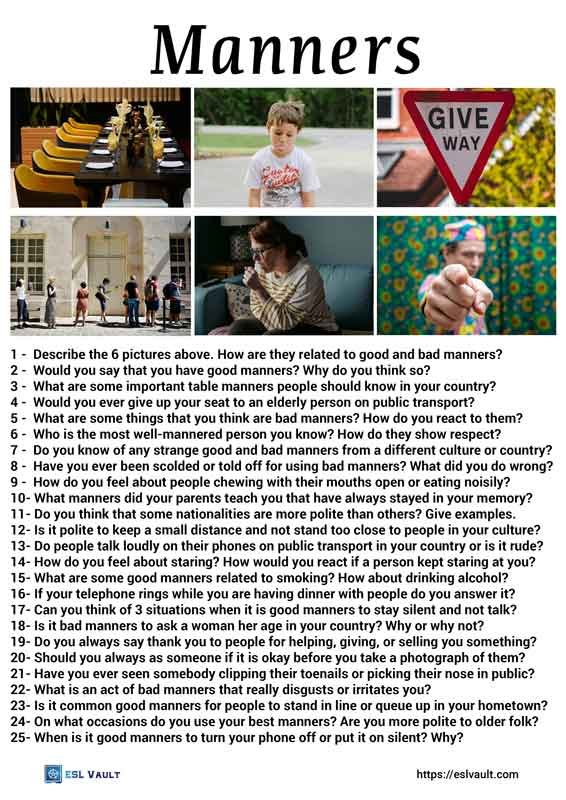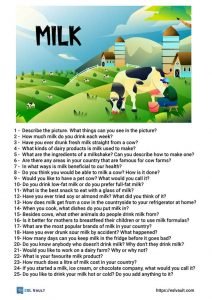Manners conversation questions
Manners are a way of behaving that can either be defined as good or bad. They are an important part of social conduct that differs between countries and cultures around the globe. You can use these manners conversation questions to discover what people believe are the best and worst ways to act in public.
The most difficult words and phrases in this speaking activity include – table manners, give up (something), respect, culture, scold, tell off, chew, polite, public, stare, situation, queue up, clip, pick, disgust, irritate, and folk.
The manners conversation questions are –
1 – Have you asked or told someone to stop being rude? Why did you do this?
2 – Would you say that you have good manners? Why do you think so?
3 – What are some important table manners people should know in your country?
4 – Would you ever give up your seat to an elderly person on public transport?
5 – What are some things that you think are bad manners? How do you react to them?
6 – Who is the most well-mannered person you know? How do they show respect?
7 – Do you know of any strange, good, and bad manners from a different culture or country?
8 – Have you ever been scolded or told off for using bad manners? What did you do wrong?
9 – How do you feel about people chewing with their mouths open or eating noisily?
10- What manners did your parents teach you that have always stayed in your memory?
11- Do you think that some nationalities are more polite than others? Give examples.
12- Is it polite to keep a small distance and not stand too close to people in your culture?
13- Do people talk loudly on their phones on public transport in your country, or is it rude?
14- How do you feel about staring? How would you react if a person kept staring at you?
15- What are some good manners related to smoking? How about drinking alcohol?
16- If your telephone rings while you are having dinner with people, do you answer it?
17- Can you think of 3 situations when it is good manners to stay silent and not talk?
18- Is it bad manners to ask a woman her age in your country? Why or why not?
19- Do you always say thank you to people for helping, giving, or selling you something?
20- Should you always ask someone if it is okay before you take a photograph of them?
21- Have you ever seen somebody clipping their toenails or picking their nose in public?
22- What is an act of bad manners that really disgusts or irritates you?
23- Is it common good manners for people to stand in line or queue up in your hometown?
24- On what occasions do you use your best manners? Are you more polite to older folk?
25- When is it good manners to turn your phone off or put it on silent? Why?

Idioms and phrases about manners
After completing the manners discussion questions, try introducing these expressions to your class or group.
To mind your Ps and Qs is to be careful of what you say around others. This especially relates to the use of bad language and swearing.
To eat like a pig is to eat in a very fast, noisy, and messy way. This is considered to be particularly bad manners in western society.
If you show model behavior, you act in a highly polite way and show extremely good manners.
When a person says “Pardon my French“, they are saying sorry foe using foul language.
Further manners activities
Here are a few ideas for follow-up activities after discussing the manners conversation questions.
- Writing, Get your class to write a list of do’s and don’ts for foreign visitors coming to your country. This should include all manners and behavior that is considered rude or polite.
- Research project. Assign students or small groups a country to research its manners. Afterward, they can present their findings to the class.
- Use either the body language conversation questions for further related discussion or the hand gestures worksheets to see what they mean in their cultures.




